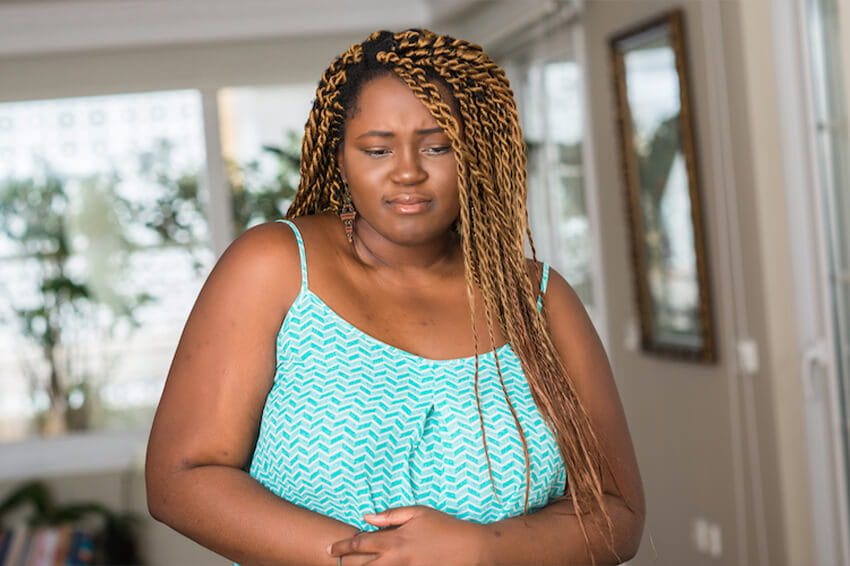Do fibroids cause weight gain?

Fibroids are small, benign tumors that develop in, around, and outside of the uterus. Throughout a woman's lifetime, there's a 70 to 80 percent chance that she develops one or more fibroids, according to Dr. Jordan Klebanoff, a minimally invasive gynecologic surgeon with Main Line Health.

Fibroids themselves don't cause true weight gain. But some fibroids can become very large, and in some cases, weigh a few pounds. These larger fibroids can press on other structures in the abdomen or pelvis and appear to cause bloating and swelling around the abdomen. Small uterine fibroids, however, typically don't cause symptoms like weight gain and bloating. The most common symptom reported by women with fibroids is abnormal bleeding before and during the menstrual cycle.
Do fibroids need to be removed?
Not all fibroids require treatment, but those that become significant in size or destructive to quality of life can be treated through medical and surgical procedures. Your treatment plan depends on your family planning needs and where you are in your reproductive journey.
What are fibroids?
Fibroids are firm balls of muscle that grow within the uterus. They're made of the same cells that the uterine muscle is made of. Though fibroids are technically classified as tumors, they are almost never cancerous.
Fibroids typically grow in three locations:
- Inside the uterine cavity
- Inside the uterine muscle
- Outside of the uterus (e.g., in the ovaries or fallopian tubes)
They may grow in just one, some, or all of these areas.
Klebanoff says that fibroids "100 percent run in families," and it's very common to see fibroids in women whose mothers, grandmothers, and sisters also had or have fibroids. Black women also have a higher risk of developing fibroids throughout their lifetime.
Fibroids can occur at any age, but they most commonly appear during the reproductive years.
Do fibroids make you gain weight?
As far as we know, fibroids themselves don't impact metabolism or cause true weight gain, according to Klebanoff. "Some women can have very, very large fibroids. In those scenarios, if those fibroids weigh one, two, three, four pounds, a person is going to notice or feel that they're gaining weight due to these fibroids," Klebanoff says.
Most women, however, have fibroids that only weigh a few hundred grams. Unless the fibroids are of a significant size, you're unlikely to experience weight gain as a symptom of fibroids.
The symptoms largely depend on where the fibroids are located.
Fibroids within the cavity of the uterus can cause abnormal bleeding, including heavy menstrual cycles and bleeding between cycles. Fibroids that are within the uterine cavity or pressing on the uterine cavity have been associated with trouble conceiving and early pregnancy loss. Fibroids in the muscle of the uterus that are four centimeters wide or larger can also be associated with fertility problems.
Fibroids that grow outside of the uterus can cause abdominal pressure or bulk if they grow to a large size. Fibroids tend to grow over time in response to hormones made by the ovaries, especially during pregnancy. After menopause, fibroids can shrink in size by about one third. Fibroids outside of the uterus are not thought to impact fertility, though they can impact the pregnancy. Fibroids can grow during pregnancy due to the higher levels of hormones being produced. If the fibroids outside of the uterus grow to be significantly large, then they can lead to abdominal pain, shortness of breath, and distension and bloating.
Fibroids can cause pain, too, though that isn't as frequently reported as abnormal bleeding, Klebanoff adds.
How are fibroids diagnosed and treated?
In certain cases, fibroids can be felt during a physical exam. The presence of fibroids can then be confirmed through an imaging study like a pelvic ultrasound, MRI, or CAT scan.
Not all fibroids need to be treated, but Klebanoff notes that fibroids should be treated when they start to impact a person's quality of life.
Many fibroids can be medically managed to correct the abnormal bleeding. Large, obtrusive fibroids can be treated through minimally invasive surgical procedures that can target abnormal bleeding and surgically remove fibroids from the uterus.
Treatment plans depend on each patient's family planning needs. "The strategies to approach and address these fibroids may be different based on where they are in their reproductive journey," Klebanoff says.
Next steps:
Make an appointment with Joseph M. Gobern, MD
Learn more about the gynecology care at Main Line Health
Get relief from fibroids